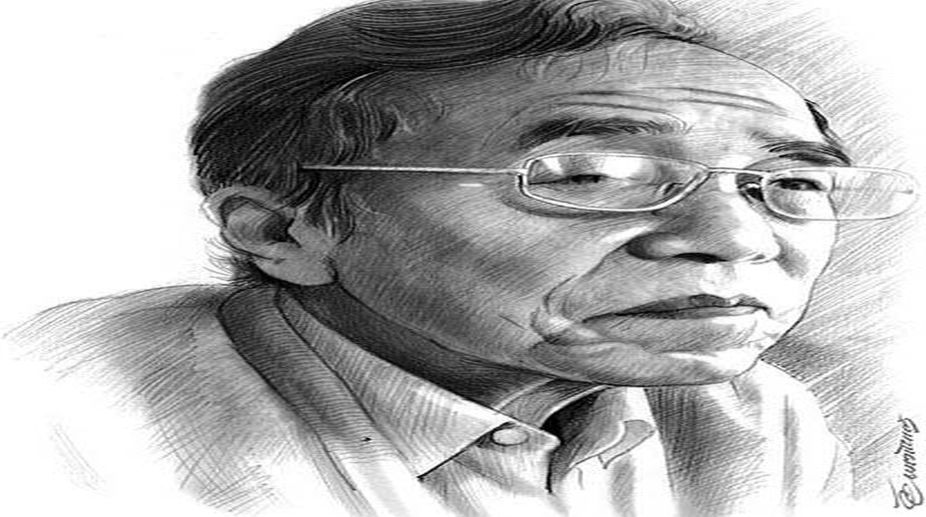From file notings to fine literature
The pen may be mightier than the sword, but why professional civil servants take to writing, especially after their retirement, perhaps like no other group of professionals, requires some introspection.

Indra Bahadur Rai
Towering literary figure known for several of his works and for introducing the ‘tesro aayam’ (third dimension) movement in Nepali literature in the sixties, is no more.
Indra Bahadur Rai’s passing away on Tuesday evening at his home at Lochnagar here, shook the literary world, with condolences pouring in from all across the world.
Advertisement
Chief minister Mamata Banerjee too sent in a message and said she was saddened at the passing away of the litterateur, “the tallest literary figure of the Nepali-speaking world in India.”
Advertisement
“The Darjeeling Hills have lost its foremost chronicler. Condolences to his family and admirers,” the CM said. Different political parties and organizations also said that it was a great loss for not only Nepali literature, but the entire Gorkha community.
Rai Born on 27 February 1927 at Balasun in Kurseong and went to St Roberts School in Darjeeling, and later St Joseph’s College here. He also went to Calcutta University for his further studies.
His work has won him accolades, while he was also the first Nepali writer to receive the Sahitya Akademi in the year 1977 for his book ‘Nepali Upanyaska Adhaarharu.’
He has also won various other awards including the Jagadamba Sri Puraskar in 1996, Agam Singh Giri Smriti Puraskar in 1997, Asarani Nirman Puraskar in the year 2000 and Bhanubhakta Puraskar in the year 2002.
Rai was also a teacher at Turnbull School and St Joseph’s College in Darjeeling. He was also the vice-chairman of the Darjeeling Municipality in the year 1965, and an executive member of the Sahitya Akademi once.
He was also involved in a movement for constitutional recognition of the Nepali language in the eighties.
However, what set him apart from others were his literary works, with him entering the Nepali literature field in the 50s when he started publishing literary criticisms in different journals, after which he started writing short stories.
His first book ‘Vipana Katipaya (some realities), a collection of 30 short stories, was published in 1960. From the sixties, he also became a prominent figure in the ‘third dimension’ literature movement along with his friends Bairagi Kainla and Ishwar Ballav.
The ‘tesro aayam’ literature aimed at uplifting man in his totality and depicting the wholeness of the human experience. His works are also included in the syllabus of many universities in India and Nepal.
The last work he released in February 2018 was ‘Pachila Chuniko Lekh,’ which consists of his unpublished writings. The Gorkhaland Territorial Administration (GTA) announced all GTA offices to be closed on Thursday to pay homage to the departed soul.
Chairman of the GTA Board of Administrators Binoy Tamang also requested students from classes IX to class XI to stand on the roadsides to pay respect to him during the funeral that is scheduled to take place on Thursday.
Rai’s mortal remains will be taken out of his home around 12 noon and taken around town, while it will be kept for a while at the Gorkha Dukha Niwarak Sammelan (GDNS) ground for people to pay their last respects.
“We are saddened by his demise. It is a great loss for the entire Nepali community not only living in Darjeeling but also Gorkhas living across the globe. He has played a great role in furthering Nepali literature and also in the political field, which will never be forgotten.This is the end of a bright era,” Mr Tamang, who is also a Gorkha Jan Mukti Morcha leader, said.
“Only one or two people are born, who, for their community and for their nation, build a golden age,” Darjeeling MLA Amar Singh Rai said of Rai.
Morcha leader Bimal Gurung also sent out a press release and said, “The crown of Nepali literature Dr Indra Bahadur Rai’s death has left the Nepali community orphans. It is a great loss as the Nepali literature has lost a pillar.”
A literary figure, Bijay Kumar Rai, said he has known him Rai for 37 years. “He has been an inspiration for us when we were youths and he guided us in many ways. His thoughts on humanity along with education and culture were something we could listen to anytime. He was our guru and it will be hard for such a figure to be born in our society again,” he said.
A delhi-based organisation, the Gorkha Sayunkta Sangarsha Samity (GSSS) announced a programme to pay homage to the literary figure at the Gorkha Bhawan in Delhi coming Sunday.
Jan Andolan Party president Harka Bahadur Chettri said Rai was a real teacher for the society here. “In Kalimpong, we will annually hold a programme where we will invite research people and hold discussions on Rai’s works,” he said.
Advertisement